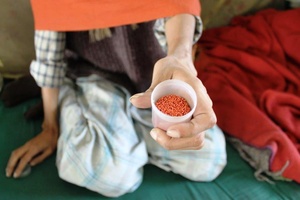India: Deserted by family, he seeks solace in PMDT staffers...
Anirban Mukherjee is from Kolkata. An only child, he is 32 years old and educated till Class 10. No one else, except him, in his family has ever had TB. He has never smoked nor ever eaten gutkha/paan masala, but used to take alcohol occasionally in the past.
Anirban was already married and had a daughter when he was first
diagnosed with TB, way back in 2002. At that time he was working
as a marketing manager in the mess of a students’ hostel
in Dhanbad, Bihar. He first took treatment in the private sector
but then came to the DOTS centre where he was on Category1
(Cat1) TB medicines for 5 months. According to him, he was told
by the caregiver at the centre that he was TB
free. So he discontinued the treatment. Two months later he had a
relapse. The cold, cough and fever returned.
“I came to K S Roy Hospital, Kolkata in 2007 and was put
on Category2 (Cat2) treatment. But even after 9 months of
regular medication my sputum tested positive. So I was declared
a Cat2 failure. My sputum was sent to an Intermediate Referral
Lab for culture and the test report confirmed that I had MDR-TB.
I started MDR-TB treatment under the government programme of
PMDT (programmatic management of drug resistant TB) in February
2010. I was on treatment for a long period of 27 months, yet at
the end of it my sputum again tested positive. Eventually I got
cured, went back to my community and back to my job in Dhanbad.
But again after a few months there was a relapse. My sputum
which was sent to a Designated Microscopy Centre for testing
(while I was working in Dhanbad) came out positive again at the
end of 2011. So in 2012 I back was in the same K S Roy Hospital
with XDR-TB.”
Meanwhile Anirban’s wife had divorced him in 2008
because of his TB, and taken away her daughter with her. His
employer turned him out of his job and his landlord threw him
out of his house. His mother too refused to take him back. He
was now without a home and without a job but saddled with drug
resistant TB -- a completely devastated destitute. Where could
he go? He could only think of knocking at the doors of KS Roy
Hospital once again and luckily for him, the Superintendent
there admitted him on compassionate grounds. When I met Anirban
in January 2013, he had already spent 14 months in the hospital
admitted as an in-patient. The nurse in charge of the MDR-TB
ward told me that he would remain there as long as his treatment
would continue.
His own people having left him, the hospital is now his home for
all practical purposes. Abandoned by family, it is strangers who
are taking care of him and attending on him. He has no visitors
from the world that exists outside the walls of the hospital.
Yet there was a glow of happiness and gratitude on
Anirban’s face as he spoke to me on that eve of the
Republic Day. He said, “I am very happy staying in the
ward here. The sisters (nurses) are doing much more than my
family could ever have done. They are very dedicated in their
work. All the responsibilities which should have been taken by
my family members are being done by the sisters the care givers
and doctors of this hospital. They are helping me in whatever
way they can. They are closest to my heart. I am too happy to
stay in the hospital. I have no feelings for my real family, but
I am very grateful to all the hospital staff.”
Anirban’s message to other TB patients—We should
have faith in the sisters and doctors, and other healthcare
givers and listen to them and follow all the instructions given
by them on infection control. We should also strictly follow the
treatment schedule and then we will be cured. I am very hopeful
of getting cured.
(This story is the third in line of the series Living with drug
resistant TB based on interviews with patients enrolled in PMDT
and highlight their personal experiences. The names of all
patients have been changed to respect their freedom of
anonymity, given the huge social and internalized stigma
connected with the disease and associated with other factors
such as poverty and illiteracy)
Source:
Citizen News Service


